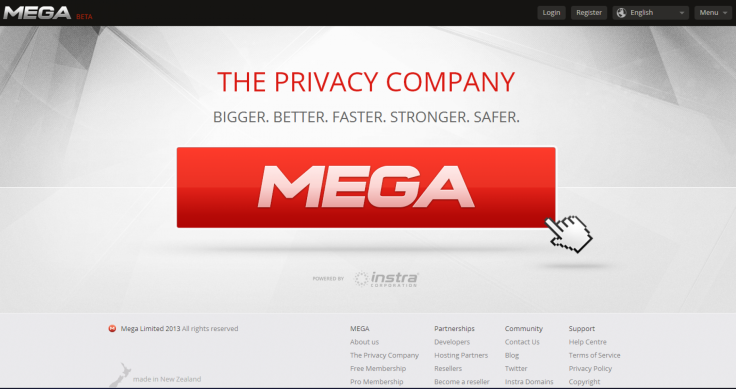Hollywood Asks Google To Censor Mega: NBC Universal, Warner Bros Accuse Kim Dotcom's Site Of Pirated Movies
Warner Bros. and NBC Universal have each submitted requests to Google to censor Mega, the file locker service founded by the controversial entrepreneur Kim Dotcom, from search results. The studios claim that the website links to content that violates copyright, while Dotcom says the request is abuse of the Digital Millennium Copyright Act and restricts access to legitimate files.
While studios send out DMCA notices all the time to make pirated content harder to find through Google, these two companies are notable for featuring Mega’s homepage, mega.co.nz, among the thousands of URL’s that allegedly link to an illegal copy of the movies "Mama" (from NBC Universal’s notice) and "Gangster Squad" (from Warner Brothers’). The problem is there are no links to these movies -- or any others -- anywhere on Mega’s homepage.

The homepage allows users to upload files to Mega’s servers to store them in the cloud. Mega then generates a URL for users to download the file again in the future. Some users share these links with friends to allow them to download the file. It is entirely possible that copies of Mama and Gangster Squad have been uploaded to Mega’s servers, but links to them would never be found from Mega’s homepage.
A large amount of these notices are automated, assembling thousands of guilty links into a list that is sent to Google. The studios don’t always check the validity of these links and often send DMCA notices for strange reasons. Recently, HBO sent a DMCA notice to Google asking them to remove their own website from search results.
Dotcom says the DMCA request is a deliberate attempt to censor the entire Mega website, and it’s not the first time the Internet entrepreneur has felt wrongly persecuted.
"Here we go again," Dotcom told IBTimes in a Twitter message. "Hollywood vs Innovation. Yesterday vs Tomorrow. They break the law again & history repeats itself."
In 2011, Mega predecessor Megaupload released an original song and music video featuring several mainstream pop stars. Although the song was commissioned by Dotcom, Universal Music had the song removed from YouTube, claiming copyright infringement.
Megaupload was shut down by the U.S. Department of Justice in January 2012. The following year, radio advertisements to promote Mega were pulled by MediaWorks New Zealand. Dotcom is also currently involved in an expensive legal battle with the U.S. government.
Google has not scrubbed Mega’s homepage from search results and will likely recognize the inclusion of Mega in the DMCA notice as a result of a faulty automation programs. As TorrentFreak notes, the amount of DMCA notices from major studios continues to increase, making it more and more difficult for Google to distinguish legitimate complaints from false ones.
According to advocates like Dotcom, these automated notices abuse DMCA and make it harder for users to access non-copyrighted material online. They maintain that in the long run, this will do more to hurt freedom of information on the Internet than curtail online piracy.
© Copyright IBTimes 2024. All rights reserved.












